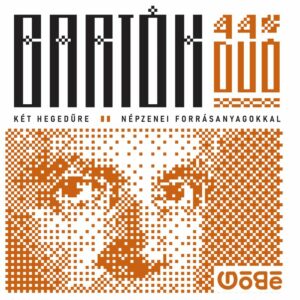
Het ensemble Góbé betovert muzikaal het werk 44 DUO van Belá Bartók.
English version below
Begin 20ste eeuw reisde de Hongaarse componist Belá Bartók met zijn tijdgenoot, de componist Zoltán Kodály, Hongarije door op zoek naar lokale melodieën. Zij noteerden en analyseerden deze en gebruikten ze (of kenmerken ervan) in hun eigen composities. Zo componeerde Kodály de weergaloze Háry János–Suite in 1926 met het voortreffelijk gebruik van cimbalom en de sterke ritmiek en componeerde Bartók zijn 44 DUO in 1931. Een compositie-reeks van 44 viool-duetten waarin Bartók Hongaarse, Slowaakse, Roemeense, Servische en zelfs Arabische thematiek verwerkte in zijn stukken. Hongarije was in de 19de eeuw groter dan tegenwoordig, vandaar dat er ook meer invloeden herkenbaar zijn in deze viool-stukken. De duo’s die in moeilijkheidsgraad toenemen: nö. 1 het makkelijkst en nö. 44 het moeilijkst.
Sinds de oprichting in 2007 stelt het ensemble Góbé zich ten doel om authentieke muziek met een open muzikale geest tegemoet te treden. De muziek blijft volksmuziek uit Hongarije maar wordt bewerkt met aanvullende instrumenten en vocalen tot, zoals ze het zelf noemen, folk-popmuziek. Een gemêleerde stijl die de muziek dichter bij het publiek brengt. Dat is ook gebeurd met de collectie 44 DUO van Belá Bartók. Een werk dat van origine bestaat uit o.a. dansmuziek, soldaten- en trouwliederen, marsen, Nieuwjaarsliederen, oogstliederen en Transsylvanische dans. In een bevlogen en gevarieerde setting, speelt de groep deze 44 duo’s. Niet in de volgorde van Bartók, maar in hun eigen reeks die qua sfeer en intensiteit beter aansluit bij hun eigen variëteit. Opmerkelijk zijn de vocalen van zangeres Eva Korpás en zanger Gergö Pojendán, de cimbalom en doedelzak van Mátyás Egervári, het pianowerk van Noémi Konta, de ney (fluit) van Fatima Gozlan, naast het werk van contrabassist András Tímár en natuurlijk de violisten Márton Rigó en Máté Vizeli. Hulde aan al deze indrukwekkende musici die hun vaderlandse muziek eren en met respect toegankelijker maken voor een breder publiek. Interessant is overigens om deze dubbel-cd opname te beluisteren naast het origineel van Bartók: bijvoorbeeld de opname die András Kiss en Ferenc Balogh maakte in 1991 voor het label Helios.
English version
The ensemble Góbé creates musical magic with the composition 44 DUO composed by Belá Bartók.
In the early 20th century Hungarian composer Belá Bartók traveled, with his contemporary composer Zoltán Kodály, through Hungary in search of local melodies. They noted and analyzed these melodies and used them (or features thereof) in their own compositions. Kodály composed the incomparable Háry János-Suite in 1926 with the excellent use of cimbalom and strong rhythms and Bartók composed his 44 DUO in 1931. A composition series of 44 violin duets in which Bartók Hungarian, Slovak, Romanian, Serbian and even Arabic themes incorporated into his pieces. In the 19th century Hungary was larger country than it is today, which is explains why there are more influences recognizable in these violin pieces. The duos that increase in difficulty: nö. 1 the easiest and no. 44 the hardest.
Since its foundation in 2007, the ensemble Góbé has set itself the goal of approaching authentic music with an open musical mind. The music remains folk music from Hungary but is adapted with additional instruments and vocals, to what they call folk-pop music. A mixed style that brings the music closer to the audience. This also happened with the 44 DUO collection by Belá Bartók. A work that originally consists of dance music, soldier and wedding songs, marches, New Year’s songs, harvest songs and Transylvanian dance. In an inspired and varied setting, the group plays these 44 duos. Not in Bartók’s order, but in their own, which better suits their own variety in terms of atmosphere and intensity. Remarkable are the vocals of singer Eva Korpás and singer Gergö Pojendán, the cimbalom and bagpipes of Mátyás Egervári, the piano work of Noémi Konta, the ney (flute) of Fatima Gozlan, in addition to the work of double bassist András Tímár and of course the violinists Márton Rigó en Máté Vizeli. Tribute to all these impressive musicians who honor their native music with respect and make it more accessible to a wider audience. By the way, it is also interesting to listen to this double CD recording alongside Bartók’s original played by, for example, András Kiss and Ferenc Balogh who recorded 44 DUO for the Helios label in 1991.
- Góbé: 44 DUO (Fonó Budai Zeneház / Xango)
© Mattie Poels.

Geen reacties